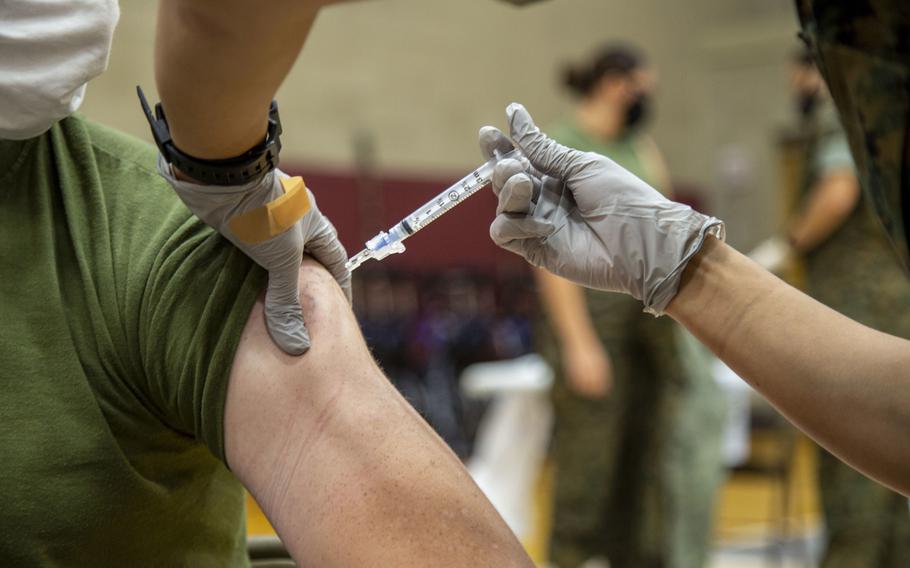
A U.S. Navy corpsman at Marine Corps Air Station New River, N.C., gives a Marine a flu shot, Oct. 22, 2020. Many U.S. military bases in Europe are still waiting to receive their full allotment of the influenza vaccine. (Karina Lopezmata/U.S. Marine Corps)
Stars and Stripes is making stories on the coronavirus pandemic available free of charge. See other free reports here. Sign up for our daily coronavirus newsletter here. Please support our journalism with a subscription.
Many Americans affiliated with the U.S. military in Europe haven’t been able to get flu shots this year, due to delays in delivering the vaccine that officials are struggling to explain.
Military and health officials have said the inoculations are particularly important this year, as they would help reduce the impact of contagious respiratory illnesses on the broader population and ease the burden on the health care system during the overlapping flu season and coronavirus pandemic.
But even as some U.S. bases in Japan wrapped up their flu vaccination drives in October and others are in the process of completing them, many Americans in Europe are waiting to be inoculated.
U.S. Naval Hospital Naples in Italy is a rare exception in Europe. It has “enough influenza vaccine on hand to inoculate all eligible beneficiaries,” a spokeswoman said last week.
But many European bases ran out of doses after immunizing healthcare workers and military members this fall.
More vaccine arrived Monday and was expected to be distributed to Army medical clinics this week, said Gino Mattorano, a spokesman for Regional Health Command Europe. Bases were expected to announce further vaccination dates soon, he said.
But the command is still waiting for about 40% of its total allotment, which would allow it to vaccinate “the rest of our beneficiaries,” Mattorano said Tuesday.
He was unable to give a precise date for when the remaining vaccine doses would arrive, saying only that officials “hope to get more ... in the next week or two.”
The Ramstein Air Base clinic, which inoculated 4,000 airmen in October, received an additional 3,500 doses this week, and the 86th Medical Group is preparing for another two-day vaccination campaign, one of which will be open to all beneficiaries, said Lt. Col. Will Powell, 86th Airlift Wing spokesman, on Tuesday.
But “this week’s shipments will not be enough to vaccinate our nearly 18,000 beneficiaries and we expect to run out relatively quickly,” he said. “Ramstein will need more doses, but we have no further information regarding timing of subsequent shipments.”
There haven't been any documented cases of the flu on Ramstein Air Base so far this season, Powell said. The European Center for Disease Prevention and Control has documented only 12 positive cases among more than 14,000 tests so far.
“For the Region as a whole, influenza activity has been at baseline level since the start of the season," the health agency said in its most recent report.
The U.S. Centers for Disease Control and Prevention says flu activity usually peaks between December and February and diminishes by May. Though the effectiveness of the flu vaccine varies from year to year, the vaccination is still recommended as it may make the illness milder and prevent hospitalization if the flu is contracted, Regional Health Command Europe said in a statement.
In years past, flu shot drives in Europe have typically begun in early October and finished by late November.
Several bases had to cancel planned community inoculation clinics last month because they didn't have any vaccine.
Some of the delay in getting the vaccine could be due to the fact many Army medical facilities in Europe ordered pre-filled syringes for at least part of their vaccine allotment, Mattorano said, although they have done that every year and it has never been an issue.
Vaccine doses in vials, which medical personnel then have to add to syringes, have already arrived and been used to inoculate members of the community, he said.
The Navy in Naples did not immediately respond to a question about whether it had ordered pre-filled syringes or vials.
Another possible explanation for the delayed delivery is that the coronavirus has “impacted global industry,” including commercial transportation, said Col. Ryan Mihata, 86th Medical Group commander at Ramstein.
More flu drives in the Kaiserslautern area were announced Tuesday, at Landstuhl Regional Medical Center, Kleber and Baumholder, although some of the announcements came with caveats.
Baumholder said it would hold seven vaccination campaigns between Dec. 7 and Jan. 6, open to all DOD ID cardholders aged 6 months and older, but warned, “Dates may change pending vaccine availability.”
svan.jennifer@stripes.com Twitter: @stripesktown